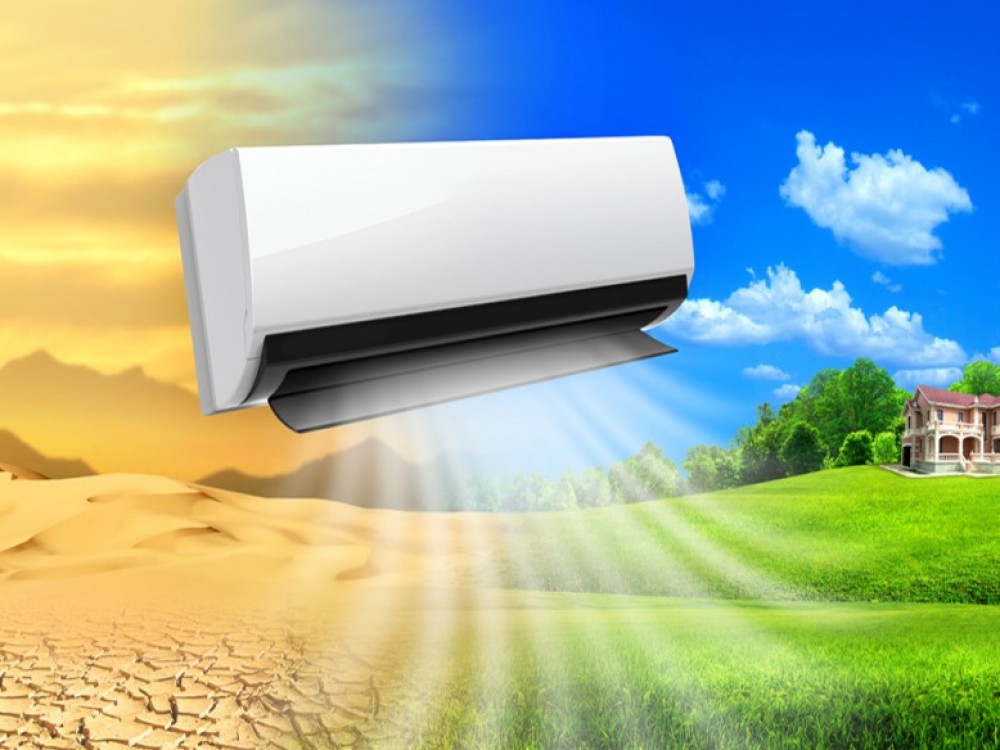Air conditioning

The concept of air conditioning.
An air conditioning system is a device, system or mechanism that stabilizes the air temperature and humidity within the area used for cooling, as well as heating according to the properties of the air at a given time, usually by using the cooling cycle but sometimes with the use of exhaust, now commonly comfort for cooling buildings and vehicles.
Simply describing this function, we would say that they absorb air from the environment at a certain temperature, treat it with their coolants and then release heat from their outside machine, while inside they return the air - which they had absorbed - cold.
Air conditioning. What it is and how it works In any room, air conditioning means good conditions of temperature and humidity, in order to have a comfortable living. air conditioners, which are now widely used (split, wall and floor type), is based on the property of some coolants (they have prevailed as "freon"). Through these liquids the machines change the temperature of a room.
In any room, air conditioning means good conditions of temperature and humidity, in order to have a comfortable living. air conditioners, which are now widely used (split, wall and floor type), is based on the property of some coolants (they have prevailed as "freon"). Through these liquids the machines change the temperature of a room.
The basic functions performed in an air conditioning system are:
Heating
It is the process of adding thermal energy (heat) to the air of the air-conditioned space in order to raise the temperature or maintain the temperature at certain limits.
Cooling
It is the process of removing thermal energy (heat) from the air of the air-conditioned space in order to drop the temperature or keep the temperature at certain limits.
Humidification
It is the process of adding water (humidity) to the air of the air-conditioned space in order to increase the relative humidity or maintain it at certain limits.
Dehumidification
It is the process of removing water (humidity) from the air of the air-conditioned space in order to drop the relative humidity or to maintain it at certain limits.
Air renewal
It is the process of taking outside air and discharging air from the premises of the building, in order to dilute the gaseous impurities of the air and to ensure the necessary quality of the indoor air.
Air purification
It is the process of removing particulate and biological air impurities in order to improve and maintain indoor air quality.
Air-Conditioning Technologies
Α) Inverter
What is Inverter technology?
Inverter technology, controls the power of the air conditioner. By changing the frequency of the power supply or the complaint, it ensures smooth linear variation of the rotational speed of the compressor which is the "heart" of your air conditioner. This allows the alignment of the cold and the heat output to the required individual real operating conditions. When the temperature of the conditioned space is very different from the set temperature, the air conditioner operates with the maximum power, ensuring fast reaching to the desired temperature. Once the desired temperature of the conditioned space is reached, the compressor precisely adjusts the power to maintain the desired temperature.
Why units with Inverter technology are more economical? Inverter technology thanks to the efficiency of air conditioning units is significantly higher during the operation at full load and part load. Given that, the air conditioning units operate more than 80% of their time at part load, the higher efficiency units with technology inverter, lead to significant energy savings of up to 30 ~ 40% of the annual energy consumption compared with fixed speed units respective strengths.
Advantages of inverter technology
• Reaches the desired temperature faster
• Start time is reduced by 1/3
• Saves energy and money due to 30% less energy consumption
• Avoides repetitive compressor operation, in other words there is no voltage peaks
• The energy cost is reduced by1/3 (compared to normal units on / off)
• No temperature fluctuations
Β) Constant speed conditioners
Constant speed conditioners function by yielding stable voltage. Once the desired temperature is reached, they stop.
Results:
• Frequent starts.
• They are always full-loaded.
What is the energy efficiency class of the units?
Energy Class is the classification of air conditioning units, depending on their energy consumption. Community legislation requires all new air conditioners coming with a label with the "energy label" of the device. The classification is done in seven different categories, A to G, with A indicating the most efficient unit and G the least efficient, which should in any case be avoided to use. Usually the most appropriate option is energy class A or even B. Choosing an air conditioner with high energy class is usually equipped with engine and compressor Inverter ensuring comfort and operating economy. Note that the choice of a unit with a high efficiency A + and the use of inverter technology can bring savings in operating costs up to 50% compared with a conventional fixed speed units and Class B Energy.





